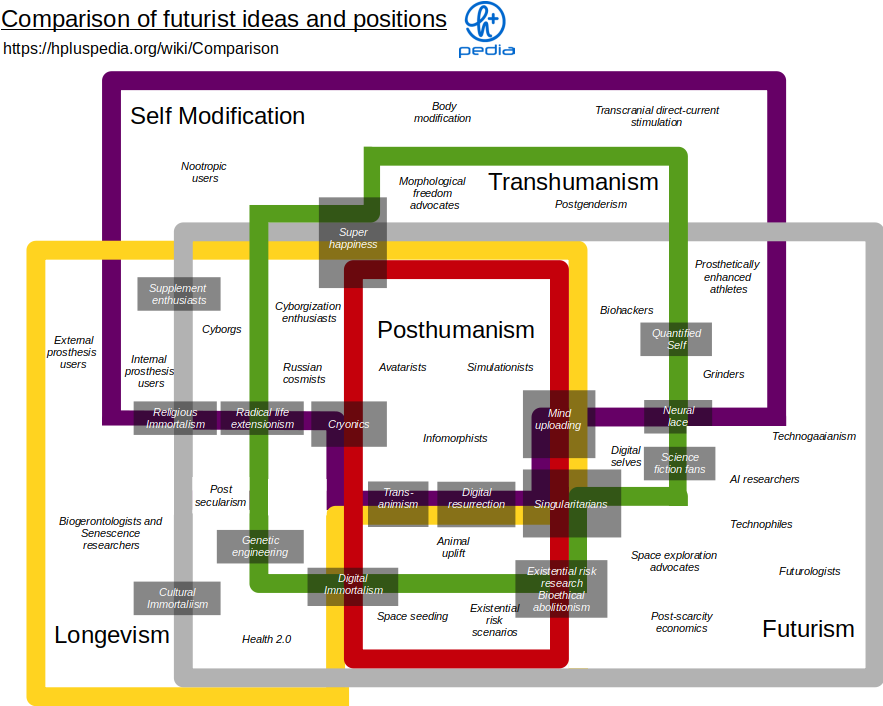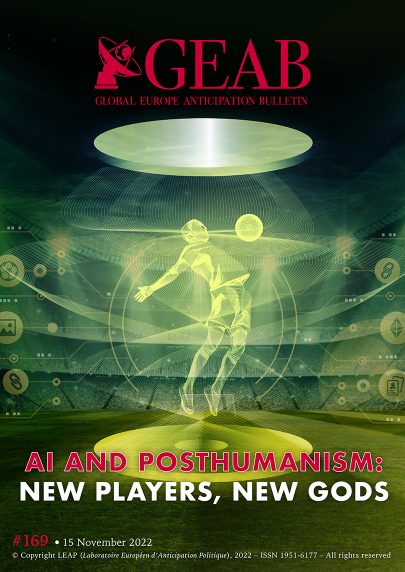GEAB 169

Did you like transhumanism? You will love posthumanism!
If the first, while wishing an increase in human, still asserted its centrality, the second intends to exceed the human and humanism in order to place the tools it has created at the core of the construction. The prefixes are important: “trans” here indicates the notion of “beyond” and therefore draws the elements that go beyond the human; “post” means “something which comes after” and therefore points out all that comes after humanism.[1]
From our point of view, the first is hypothetical, the kind of utopianism that changes (too) easily into dystopia.[2] The second will happen no matter what: humanism, like any ideology, is not eternal, and will be succeeded by another paradigm. Let’s stop for a moment to consider this notion which, in itself, may well motivate many strategies around the world. What could be after the human in the continuum of progress in which the advocates of this kind of theory are undoubtedly involved?
There could well be a rupture. Finally, the world has always been hesitating between humanism (placing the human at the centre) and thought (placing the ideas of the human at the centre). Two major forms of the second category can easily be identified: religions and ideologies. In both cases, they are ‘human ideas’ that at some point take on a predominant role: Religions are always born from a swing towards the human before coming to crush the latter under its dogmas and carcans; ideologies are born from humanist idealism to come to crush the human under their absolutisms from freedom to terror, from Marxism to Stalinism, from futurism to fascism, from capitalism to neo-totalitarianism[3], or from ecology to ecofascism or ecototalitarianism, [4] and so on …)
If posthumanism is a continuation of trans-humanism, then it is human creations to overcome one’s own condition that will be set up as beliefs, as gods. This is where the break lies, because religions and ideologies are systems for organising human societies. This new stage will propose faith in material creations, improvement of our physical capacities (by taking “drugs” or by direct surgery on human bodies) and intellectual capacities (artificial intelligence). There is no longer any question of believing or doubting in the existence of a God or in the relevance of a political idea, it is all material.
Unsurprisingly, the great humanist movement that presided over the advent of the Internet is now reaching this totalitarian stage, placing the tool above the humans who invented it. If this perspective does not herald anything good for the next 20 years, it also allows us to understand that it is a new bump in history that humanity is beginning to go through, but also that all hopes are permitted for the outcome of the dark period opening up.

Figure 1 – Representation of the various ideologies related to transhumanism and posthumanism. Source: hpluspedia
If we consider the overcoming of humanism, and thus the advent of a form of posthumanism, as inevitable, it is because there is already fertile ground for at least three reasons:
The periods of containment in 2020 have seen a revealing trend emerge on social networks under the slogan “we are the virus”.[5] Seeing the return of animal wildlife to populated areas where it had become scarce, some humans saw themselves as the intrinsic cause of nature’s destruction, seeing these manifestations of thriving biodiversity as a form of legitimate revenge.[6] The logical, and terrifying, extension of this reasoning is an eradication of humanity, since it is a virus, to make way for the wild life that occupies the rightful place on Earth. A step that fortunately most of these Internet users did not take.
Nevertheless, a loss of faith in humanity can be observed among the younger generation in many countries of the world. An ambitious study questioned 10,000 people aged 16 to 25 in ten different countries to gauge their potential anxiety about climate issues. To the question “Is humanity doomed?” 55% of them answered yes. [7]
Humanity has pushed technological progress so far that the vast majority of the population now uses tools on a daily basis whose operation they are unable to explain clearly.[8] A smartphone or a computer is not a hammer or a saw. Most of us are unable to understand, repair, and therefore really master all the digital and electronic tools, now essential to our daily lives. This lack of mastery and understanding implies a form of confidence, not to say belief, in the effectiveness of these tools.[9] A belief that could be cynically exploited by those of us who have mastered these tools, even if this total mastery would be a delusion.[10] It is because we do not know, and cannot know, what there is after death that religions have thrived on the promise of a paradise, an eternal life, and have thus given themselves the means to impose dogmas.
If humanity is doomed, if it acts as a virus for its habitat, and if it has tools considered more efficient than itself while being unable to fully understand them… what is to prevent “what comes after”, or even what “goes beyond” itself, from what it had created as the closest to its own condition, humanism?
We have therefore explored these ideas in the following two articles. The first is devoted to sport because we collectively recognise athletes as the best among us according to clear evaluation criteria. If we are to increase our own physical capabilities, it would be logical, and more importantly more socially acceptable, to start with this area. This allowed us to test the realism of these ideologies, where artificial intelligence is already widely used, while the augmented athlete is still only a myth. It was also of course an opportunity to anticipate the geopolitical implications of the organisation of international events, of which the World Cup in Qatar is an emblem. The second is devoted to posthumanist fiction because we recognize the power of imagination and the healing value necessary to apprehend upheavals of such potential scope.
Hoping that these pages will not alter your faith in humanity, enjoy the reading.
Join the GEAB Community on LinkedIn for more discussions on this topic.
________________
[1] Source: The Conversation, 10/02/2021
[2] Although its potential for achievement should not be underestimated as it attracts global economic and political heavyweights. Source: Darren Winters
[3] Source: Revue l’Esprit libre, 04/11/2015
[5] See this on twitter for instance.
[6] Source: Sage Journals, 10/06/2020
[7] The countries of origin of the respondents were: Australia, Brazil, Finland, France, India, Nigeria, Philippines, Portugal, United Kingdom, and United States. Source: The Lancet, 12/2021
[9] This idea is used in Isaac Asimov’s novel Foundation (Gnome Press, 1951), which focuses on nuclear technology. In the society imagined by the author, nuclear power stations are so efficient and long-lasting that, generation after generation, those who maintain them end up not knowing how they work at all, since they have never had to intervene in them. This incompetence is then exploited by the members of the Foundation who have transmitted this knowledge, to establish the religion of science…
[10] Source: Interesting Engineering, 06/04/2019

Rarely has a sporting event caused so much ink to flow before it even started. The football World Cup in Qatar starts this month and it is no less than [...]
Article written by Mara Magda Maftei, University Professor at the University of Economic Studies in Bucharest, visiting scholar at the College of Global Studies, holder of a PhD in French [...]
As expected, with the mid-terms soon behind us, the Fed is starting to prepare for a slowdown in monetary tightening in December. Goldman Sachs is trying to make it look [...]
Wealth management - What should Europeans do? // Investments - Find the exit // Tax havens - New horizons // Real Estate - Save yourselves // Commodities – Beware // [...]

Comments